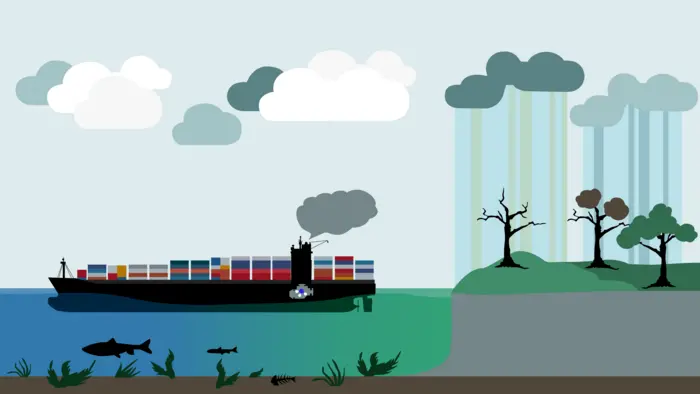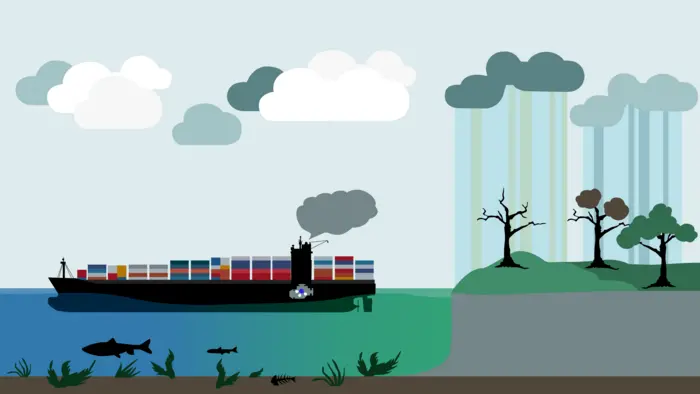Switching to ammonia as a marine fuel, with the goal of decarbonisation, can instead create entirely new problems. This is shown in a study from Chalmers University of Technology in Sweden, where researchers carried out life cycle analyses for batteries and for three electrofuels including ammonia. Eutrophication and acidification are some of the environmental problems that can be traced to the use of ammonia – as well as emissions of laughing gas, which is a very potent greenhouse gas.

Credit: Illustration: Chalmers University of Technology/Petra Persson
Switching to ammonia as a marine fuel, with the goal of decarbonisation, can instead create entirely new problems. This is shown in a study from Chalmers University of Technology in Sweden, where researchers carried out life cycle analyses for batteries and for three electrofuels including ammonia. Eutrophication and acidification are some of the environmental problems that can be traced to the use of ammonia – as well as emissions of laughing gas, which is a very potent greenhouse gas.
In the search for viable fossil-free marine fuels, ammonia has been on the agenda for several years as one of the strongest alternatives. Ammonia (NH3) is a carbon-free fuel and has the advantage of a higher energy density than, for example, hydrogen. It can also be liquefied fairly easily although it is a gas at standard conditions. However, a significant disadvantage is that the production of electro-ammonia – which requires electricity – is very energy intensive.
Moreover, the new study shows that an eagerness to rid the shipping sector of carbon emissions, by using ammonia, might create entirely new problems instead.
“Although ammonia is carbon-free, its combustion in engines is not free from greenhouse gas emissions”, says Selma Brynolf, Chalmers researcher and co-author of the paper. “Engine tests have shown varying degrees of emissions of laughing gas, which is a very potent greenhouse gas with more than 200 times the global warming impact than carbon dioxide.”
“There is simply a lack of deeper risk analyses of what a switch to ammonia could mean”, says Fayas Malik Kanchiralla, PhD student at the Department of Mechanics and Maritime Sciences at Chalmers and lead author of the paper.
The alternative with the lowest cost is environmentally problematic
The researchers used life cycle assessment and life cycle cost to evaluate technical viability, environmental impacts, and economic feasibility for four types of renewable energy carriers, for three different types of ships. The energy carriers examined included electricity via batteries, and three electrofuels: hydrogen, methanol, and ammonia. The energy carriers were in turn used in combination with both engines and fuel cells.
The study shows that ammonia and methanol have the lowest cost of the alternatives studied.
“The market is usually drawn by costs, and since electro-ammonia has the lowest cost, the market is aiming towards it. There is a hype around this fuel in shipping today. But if, and when, we make a shift to ammonia, it is to solve the problem of using fossil fuels, and at the moment it seems like we might end up creating more problems instead”, says Fayas Malik Kanchiralla.
This is because ammonia comes with a set of environmental disadvantages. Its use as a fuel can affect air and water quality due to ammonia leakage and emissions of nitrogen oxides (NOx), such as laughing gas (N2O). Fayas Malik Kanchiralla and his colleagues stress the importance of controlling this for ships operating in areas with emission controls, for example a sensitive marine area such as the Baltic Sea.
Electrofuels are synthetic fuels that are produced with electricity, in a process where energy-rich molecules are made from other molecules. These fuels are defined as ‘green’ when they are produced with renewable electricity. But the study shows that all three green electrofuels have a higher environmental impact than traditional fuels in terms of human toxicity, use of resources such as minerals and metals, and water use.
Eutrophication and acidification are some of the risks
The use of ammonia is associated with substantial toxicity challenges and risks, which are manageable, but would increase the complexity of the safety systems required. This would potentially limit the use of the fuel to only deep-sea cargo ships.
“Among the environmental problems that can be traced to use of ammonia are eutrophication and acidification”, says Fayas Malik Kanchiralla. “To sum up; even though green ammonia is a fossil-free and relatively clean fuel, it is probably not green enough for the environment as a whole. More risk assessments on the emissions of ammonia, and the related nitrogen compounds, need to be done before adopting this fuel for shipping.”
The study also shows that it is very difficult to find a simple non-fossil fuel solution that both works for all types of ships and is able to meet the goal of reducing greenhouse gas emissions in shipping. Assessing the environmental and economic aspects of different fuel options for the shipping sector is complex, and several factors need to be considered when developing climate strategies for various types of ships and modes of operation.
“From a life cycle perspective, one needs to find different types of solutions for decarbonisation for different kinds of ships”, says Fayas Malik Kanchiralla. “There is no silver bullet. More research and more life cycle analyses need to be done.”
More on the research:
The study How do variations in ship operation impact the techno-economic feasibility and environmental performance of fossil-free fuels? A life cycle study has been published in Applied Energy and is written by researchers at Chalmers University of Technology and Research Institutes of Sweden. The research was funded by the Swedish Transport Administration, the competence center TechForH2 and the project ‘HOPE’.
Journal
Applied Energy
DOI
10.1016/j.apenergy.2023.121773
Method of Research
Data/statistical analysis
Subject of Research
Not applicable
Article Title
How do variations in ship operation impact the techno-economic feasibility and environmental performance of fossil-free fuels? A life cycle study
Article Publication Date
15-Nov-2023





